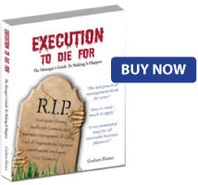Case Studies
"What are the outcomes that we can expect from the surveys?"
This is probably the most frequently asked question from those contemplating one of my customer feedback surveys and it’s a difficult question to answer because there are so many ways in which the feedback can be used. In truth, there are many uses that go way beyond those that I envisaged when these surveys were first developed.
So rather than list the outcomes that I had in mind, what follows is a selection of the ways in which my clients have benefitted from their use:
| Key Performance Indicator | Customer Service - Balancing IT And People |
| How Do We Best Compete? | Employee Engagement |
| Where Have All The Flowers Gone? | The Only Constant In Business Is Change |
Key Performance Indicator - Fenwick Software
Peter Fenwick, Managing Principal of the IT software company that bears his name, has commissioned Plans To Reality (when it was still operating as bpi Consulting) to undertake three surveys over the years. Peter would be the first to admit that he was disappointed with the satisfaction levels recorded in the first survey. In his words, “We learned that, as a professional service provider, there is a gulf of difference between quality of work and quality of service - and the latter is the real battleground between IT providers.”
Fenwick Software took a whole raft of initiatives in response to the feedback. By quoting fixed fees wherever possible, developing a Professional Services Policy that set out how Fenwick would work with its clients, providing an electronic help-line, an up-graded and more timely Project Reporting system, and a Dispute Resolution Procedure, Fenwick Software was able to raise its Customer Satisfaction Index by 11.1% and reduce its overall golf score for the complete round of attributes measured from a very ordinary plus 23 to minus 2. The average rating for their quality of customer service rose from 7.3 to 8.3 out of 10.
What is even more interesting is that there were very few staff changes over the period of the three surveys. Fenwick simply accepted the feedback and in response, undertook a thorough overhaul of the way in which the Company serviced its clients.
| "The benefits from this exercise have been wide ranging" says Peter Fenwick. "Not only is our quality of service now on a par with our quality of work but our existing clients have become great advocates for us. Favourable word-of-mouth is still the most effective promotional tool in this intensely competitive market." |
Customer Service - Balancing IT And People - John Danks & Son
If you asked people what has had the most impact on their everyday lives in the last twenty years, most would say “computers and Information Technology”. Running a close second would be changes in retailing.
No retailing sector has undergone more change than hardware. Twenty years ago, we all had access to a small independent hadware store where we could buy nails by weight and didn’t have to break into blister packs!
How things have changed! Now the hardware market is dominated by the big three chains, one of which is John Danks & Son through its ownership of the Home Timber & Hardware, Thrifty-Link and Plants Plus brands. The three chains use different business models but the target market is pretty much the same - consumers and tradesmen who want to be able to purchase a bewildering variety of products for home, trade and garden use from the same outlet.
Because of the huge logistical challenges involved in servicing the retail outlets, Information Technology plays a major part but John Danks & Son is ever conscious of the role that personal relationships still play. Indeed, our surveys cosistently show that the old adage - people buy from people - is as true now as it ever was. In order to gauge whether they are maintaining the right balance between IT and people, Danks undertake regular periodic surveys among their member stores.
As Steven Johnston, National Retail Operations Manager explains: “All our Members own their own stores and nurseries. The agreement that we have with them is that we will provide them with a range of support services from store merchandising to direct mail catalogues and will source, stock and supply the thousands upon thousands of products that need to be found in a modern hardware store. But Danks Members are not obligated to purchase their stock from Danks. We have to demonstrate that our service is superior and our pricing is comparable to that of other potential suppliers.”
Such has been the growth of the hardware business in recent years, particularly in the number of imported lines, the supply chain has been stretched to breaking point.
| “We need to know,” says Steven Johnston, “ not only how we are performing from our Members’ standpoint, but also the strength of the business relationship. These surveys provide us with that information. And being in quantitative form, we can compare the feedback from one survey to the next to see the impact of initiatives we have taken.” |
How Do We Best Compete? - Edlyn Foods
Edlyn Foods is a long established Victorian company, manufacturing a range of products from vinegar and relishes to toppings and cordials. Its customer base is the food service market and its competitors are the giants of the industry - Cadbury Schweppes, Goodman Fielder, Allied Mills and Cottees among them.
What Edlyn’s CEO Andrew Donelly wanted to know was how best to compete with these companies with their much greater resources. Where did his competitive advantage lie - in the products themselves or in superior logistics, promotional support or customer service? What initiatives would he need to take to reproduce their Victorian success interstate?
Edlyn, to date, has undertaken three customer feedback surveys and each of them has enabled Edlyn to refine its strategies for interstate expansion. In every survey, the respondents have been divided into two groups - Victorian and interstate - so the feedback from one can be compared with the other.
“Plans To Reality (formerly bpi Surveys) had been mentioned to me by a CEO mentoring group to which I belong. I was attracted by the range of feedback, the way in which the survey could be customised to my needs and the fact that the data is analysed and interpreted - it’s not just a mass of information,” says Andrew Donelly.
It quickly became apparent that Edlyn’s success in the Victorian market was due to a combination of logistics and customer service. 61% of respondents who also purchased from Edlyn’s competitors believed that Edlyn was “easier to do business with” than with their rivals. That percentage dropped to 30% among the interstate customers. Since Edlyn clearly has a very competitive business model in Victoria, the strategy is to replicate this model interstate.
| Andrew Donelly comments, “These surveys do three things - they provide us with information on which to base our decision-making, they tell us the impact of the initiatives taken and enable us to check that the high standards that underpin our business in Victoria are being maintained.” |
|
Employee Engagement - RCR International
The core of any customer feedback survey is a list of supplier attributes that respondents are asked to rate for Importance and the Supplier’s Performance. They number between twelve and seventeen and range from obvious ones such as Product Quality, Customer Service and Price to less obvious ones such as a “Can do” attitude and the Accuracy of the Paperwork. They are designed to cover every facet of a company’s operations. The feedback not only provides overall measures of a company’s performance from its customers’ perspective but also a satisfaction rating for every function it undertakes to meet customer needs.
RCR International has regularly commissioned bpi to conduct feeback surveys among its customers. The latter include the major hardware chains and commercial users. In addition to the monitoring of customer satisfaction levels, RCR uses the feedback to align and motivate its staff.
“When Graham completed the first survey” says Mike Amiel, RCR’s Managing Director “we asked him to present the findings at a strategic planning workshop. It was a fantastic way to kick off the workshop as it really turned our minds to what our customers thought about us. It reinforced the need to look at all the issues we debated at the workshop from the customer’s perspective.” “Nowadays, all members of staff attend the presentation of the latest feedback. Ours is a team effort and I’m there to give praise where it’s due, to make sure that everyone knows the goals and the strategies to get there and to lead the discussion on what we can do even better to meet customer needs. The commitment and enthusiasm of our staff is key to achieving success”, Mike adds “and everyone sharing in the feedback - whether or not it’s directly related to them - is a good way to stimulate ideas and help everyone appreciate the big picture”. |
|
Where Have All The Flowers Gone? - Tesselaar Flowers
The supply chain for cut flowers is a highly sophisticated one. Not only does the natural product vary in quality and quantity, the supply chain also has to handle a product with an average “shelf-life” of six days from grower to the final consumer. After delivery to Tesselaar, the flowers are briefly stored in cool rooms, each set to a specific temperature dependent on the variety, before distribution to the florist in specially designed containers. Moreover, Tesselaar stock around 400 different products from exotic seed pods from Queensland to orchids from Thailand.
100 retail florists participated in the survey, divided into groups of 20 depending on which of five distribution centres serviced their needs. The survey form itself was put together by bpi and Steve White, the CEO and joint owner of Tesselaar Flowers. “Ours is a highly decentralised operation - we have a tiny Head Office staff - the managers of our distribution centres do the buying as well as overseeing the sales operations. Tesselaar is the only supplier that operates nationally so each region has its own group of competitors. We wanted to quantify the strengths and weaknesses of each region and to see where our competitive advantages were.”
As is always the case with these surveys, there are also spin-off benefits. Tesselaar have a policy of using trained florists in sales positions in the belief that it is important that Tesselaar staff understand the market from their customers’ perspective. Tesselaar’s customers certainly agreed, giving them one of the highest ratings for quality of service that bpi has ever recorded.
The feedback and its analysis has met Steve’s expectations: “We now have a very clear picture of our performance by Distribution Centre. I am close enough to the market to form overall impressions but having quantitative data in the form of Customer Satisfaction Indices, Performance Gaps and golf scores really lends substance to these. And there were some surprises … But we have a very clear idea of the areas that we need to focus on to further improve our performance.” “All our Distribution Centre managers have discussed the feedback with their staff”, says Steve White. “It’s a good motivator to be “in” on such an exercise as well as to receive a pat on the back from their customers that they speak to - often on a daily basis”. |
|
The Only Constant In Business Is Change
Megara (Australia) Pty Ltd is Australia’s leading manufacturer of polypropylene sheet, a product that goes into a myriad of end uses from stationery and packaging to Point-of Sale displays. In recent years, Megara has commissioned bpi to carry out two client feedback surveys to assess current satisfaction levels, identify changing customer needs and how Megara might best respond to them.
Andrew Rundle, the Chief Operating Officer at Megara, summarises the outcomes from the surveys. “Graham was able to extract crucial information from our customer base in a very unobtrusive manner which has helped validate critical business decisions for future growth and client satisfaction”.
Because of bpi’s experience in management and strategic marketing, the feedback report not only analyses the feedback but assesses its implications on all the key internal functions of the organisation concerned. “The feedback report bpi presented at the conclusion of the customer interviews was extremely comprehensive and easy to understand. It identified our performance gaps in line with market segments which helped to define areas for improvements. I would highly recommend any organisation to undertake this process with bpi consultants to validate market perceptions of your business and identify future performance and growth opportunities,” says Andrew. |
|
The average participation rate among respondents for these surveys remains at 94% so we can guarantee that the feedback is highly representative. One reason for this is that we will never market research or promote new products and services directly. If customers are to participate, they need to feel that there is something in it for them.
So when a client approaches us and asks us to get some feedback on a new product or service that the organisation is considering, we obtain that feedback for the client but not in the way that might have been anticipated. Rather than explore the appeal of the solution, we focus on exploring the problem or problems that the new product is designed to address. This way, not only do we quantify the customers’ needs without disclosing any information about our client’s developments, but we tap into the customer’s real area of expertise - problems and issues - rather than solutions.
I invite you to explore the links below:
Monitoring, Measuring & Adapting














